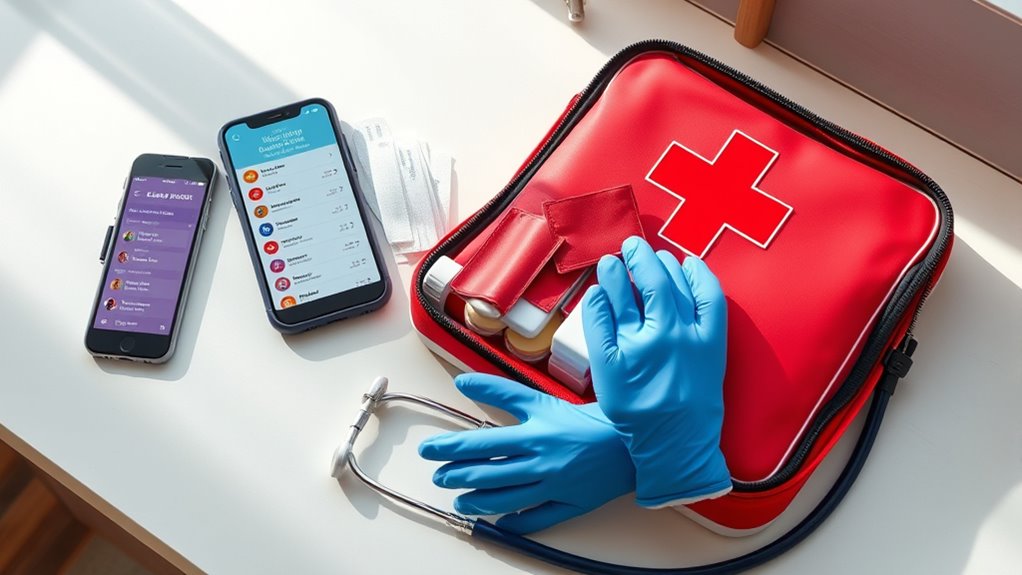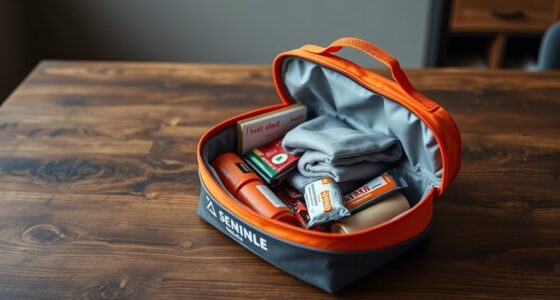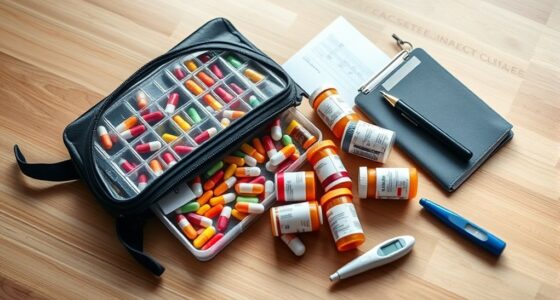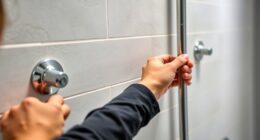To be truly prepared for a medical emergency, keep a list of essential contacts like local emergency services, your healthcare provider, and nearby hospitals nearby. Have your emergency kit stocked with essentials and guarantee everyone in your household knows where it is. Regularly update your contact information and refresh your first aid skills. By staying organized and informed, you’ll respond faster when it matters most—learn more to make sure you’re fully ready for any situation.
Key Takeaways
- Keep a list of emergency contacts, including local hospitals, poison control, and healthcare providers, in an easily accessible location.
- Store vital personal health information, such as allergies, medications, and medical conditions, for quick reference.
- Have a fully stocked and up-to-date emergency kit with first aid supplies, medications, and essential tools.
- Know the location of the nearest hospital or emergency services and have a plan to reach them swiftly.
- Regularly review and update all contact information, medical details, and emergency procedures to ensure readiness.
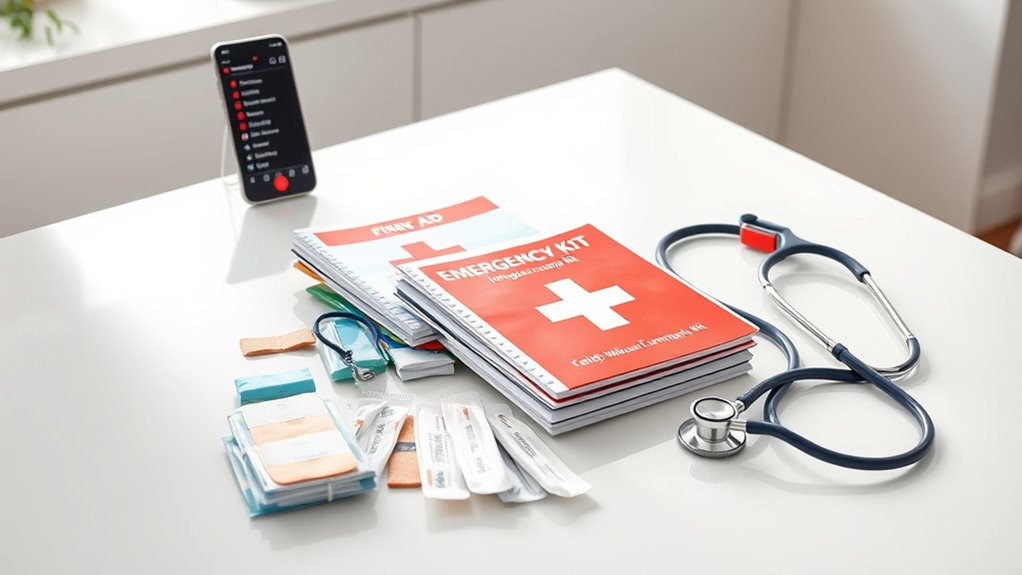
Are you prepared to handle a medical emergency when it happens? Being ready can make all the difference in how quickly and effectively you respond. One of the most important steps is ensuring you have proper first aid training. Knowing basic first aid skills allows you to stay calm and act confidently, whether someone is bleeding, choking, or experiencing a sudden illness. If you’re not already certified, consider taking a course that covers CPR, wound care, and how to assist someone having a seizure or stroke. These skills aren’t just for professionals—they’re for everyone, and they can save lives.
Proper first aid training empowers everyone to respond confidently and save lives during emergencies.
Equally essential is assembling a well-stocked emergency kit with the essentials. Your emergency kit should be easily accessible and contain supplies like bandages, antiseptic wipes, adhesive tape, scissors, gloves, and a thermometer. Include pain relievers, allergy medications, and any personal medications that might be needed in a crisis. Don’t forget to add a flashlight with extra batteries, a whistle to signal for help, and a list of emergency contacts. Having these supplies on hand ensures you’re ready to address minor injuries immediately and can manage more serious issues until professional help arrives.
Creating a plan for emergencies is just as critical as having the right supplies. Know the location of the nearest hospital and emergency services in your area. Keep a list of emergency contacts, including family members, neighbors, and local healthcare providers. Make sure everyone in your household knows where the emergency kit is stored and understands the basic procedures for common emergencies. Practicing what to do in a simulated scenario can boost confidence and ensure everyone responds swiftly when it truly counts.
Stay updated on first aid training and refresh your skills regularly. Many organizations offer free or inexpensive courses that keep your knowledge current. Also, review your emergency kit periodically to replace expired medications, replenish supplies, and update contact lists. Remember, the goal is to be proactive, not reactive. Having the right knowledge and supplies at your fingertips means you’re not just hoping you’re prepared—you actually are. When an emergency strikes, your readiness can provide comfort, control, and, most importantly, the best possible outcome for everyone involved.
Frequently Asked Questions
How Often Should I Update My Emergency Contact List?
You should update your emergency contact list regularly to guarantee accuracy. Follow proper updating procedures, such as reviewing and confirming contact details at least every six months or whenever there’s a change in your contacts’ information. Maintaining an up-to-date list helps in emergencies by providing reliable contact information. Remember, consistent contact frequency updates ensure your list stays current, so you’re always prepared when it matters most.
What Are the Most Essential Medical Documents to Carry?
Did you know that 1 in 5 medical emergencies involve unknown allergies or conditions? That’s why carrying essential medical documents is vital. You should always have a medical ID bracelet, which quickly informs responders of allergies or chronic conditions. Also, keep your emergency kit contents organized, including copies of your health insurance, medications, and emergency contacts. These documents can save valuable time and potentially your life during a crisis.
How Can I Prepare a Medical History for Emergencies?
To prepare a medical history for emergencies, you should create thorough medical history documentation that includes your past illnesses, surgeries, allergies, and current medications. Keep an updated emergency medication list with dosages and frequency. Carry a concise summary of your medical history and medication list in your wallet or phone, and share it quickly with emergency responders when needed. This guarantees they have critical info to provide appropriate care immediately.
What Mobile Apps Help Manage Emergency Medical Info?
You can use mobile apps like MyChart, Medisafe, or Apple Health to manage emergency medical info. These apps help with medication reminders and health tracking, so you stay organized. You can easily store your medical history, allergies, and emergency contacts, making essential information accessible quickly. This way, you’re prepared for emergencies and can share accurate details with healthcare providers instantly.
Who Should I Notify First During a Medical Emergency?
During a medical emergency, you should immediately notify emergency services by dialing 911 or your local emergency number. Emergency communication systems, like medical alert systems, can alert responders quickly if you’re unable to communicate. If possible, inform a trusted family member or friend afterward. Prioritizing emergency services guarantees you get professional help fast, while notifying loved ones keeps them informed and involved in your care.
Conclusion
Being prepared for a medical emergency isn’t just smart—it’s crucial. Keep essential contacts, medical info, and supplies easily accessible, because in moments of crisis, every second counts. Think of your emergency kit as a safety net, ready to catch you when you fall. Don’t leave your well-being to chance; be proactive. Remember, preparedness isn’t just about yourself—it’s about protecting those you love. Stay ready, stay safe—because hope isn’t a plan.
